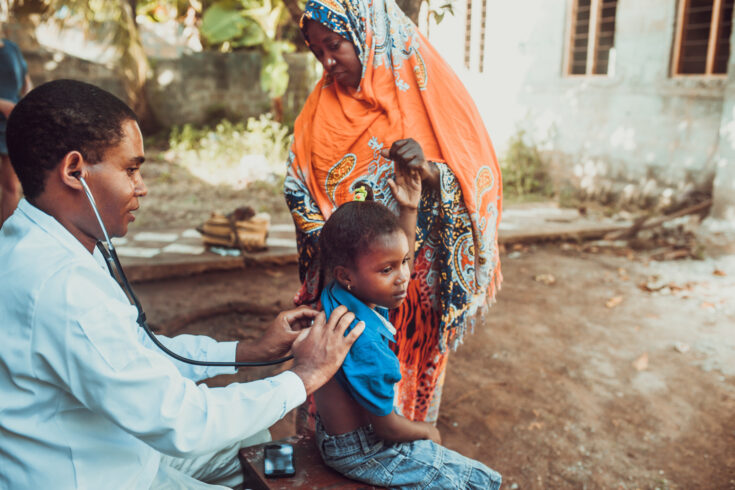As much as we need research into the therapies, vaccines and diagnostics that people need and trust, we also need health policy and systems research. This helps us get to the bottom of the systemic challenges that are all too common.
In our day to day lives, most people experience only a small part of what makes a health system. When we fall sick, we go to our doctor. We might then go to a pharmacy to buy medicines or a lab to get tested, or need to get admitted to a hospital, where we interact with a range of care providers.
We might pay for the services we receive or alternatively, be covered through private insurance or through government taxes. We might occasionally encounter a public health worker when they immunise our children or when they interview us for a survey.
Complex machinery behind the scenes
There is however complex machinery behind this visible manifestation of services that actually makes the health system work. A health system works when:
- it has enough health workers with the right skills, doing what they are needed to do, when and where they are needed to do it. That’s easier said than done
- it is able to gather the information it needs and use it to help our health institutions learn about how to look after people and communities better
- it effectively procures and delivers vaccines, medicines and supplies to where they need to be used
- it has the means to generate and use the money and resources it needs to do all that
- it is led and managed in a way that it is able to look after people effectively.
All of this is made possible through a complex web of organisations working together. And when parts of the system don’t work, that affects everything. We ask:
- why are we not getting enough vaccines to everyone who needs them?
- why do we have to wait for days, weeks or months to see a carer?
When we ask such questions, there is often a complex set of reasons behind this. It could be a problem of supply or an ethical or political problem with the way resources are distributed among people who need them.
Asking and answering the tough questions
More and more researchers from the world of public health and the social sciences started getting involved with answering these questions. And so, the field of health policy and systems research evolved and grew. In 1999 the World Health Organization established the Alliance for Health Policy and Systems Research to help strengthen this growing research field.
The Alliance has helped to develop the field globally and supported low- and middle-income countries (LMICs) to generate and use health policy and systems research and build capacity where it is needed most.
A key effort supporting the generation of new evidence on health policies and systems in LMICs is the Health Systems Research Initiative (HSRI), funded by:
- the Medical Research Council
- Foreign, Commonwealth and Development Office
- Wellcome
- the Economic and Social Research Council.

Abandoned Ebola Treatment Centre, at a remote location outside Bo city in Sierra Leon. Credit: Ebola Gbalo
Since its launch in 2013 the HSRI scheme has supported 92 research teams across 42 countries. A recent review of the scheme shows how these projects have supported the generation of new evidence on an array of complex health system problems in diverse settings. From strengthening health systems resilience, to improving the quality of care in the private health care sector and improving community-led governance of health services.

Fieldworkers from the Ebola Gbalo project crossing a river to reach a health facility to conduct interviews. Credit: Ebola Gbalo
Even though the portfolio is still young, some of the findings have already informed policy and practice. This includes the Ebola Gbalo project, influencing government responses to COVID-19 in Sierra Leone and the Sudan, and the Ebola response in DR Congo. The project’s research highlighted the benefits of local community involvement during the 2014 to 2016 Ebola epidemic.
More work needed
Health policy and systems research is growing in acceptance in the community of global health leaders and policymakers. But it is still very poorly funded compared to other forms of research. This is oddly dissonant with the types of problems and challenges that confront LMICs, most of which are systemic problems.
While it is a neglected field, the HSRI scheme has provided a valuable funding resource and the recent scheme review provides rich data on how the research is starting to deliver impact. In looking to improve health in LMICs, the people who will bring the needed changes are decision makers in health systems.
Ask them what challenges they face in improving the health of their people and most of these challenges will relate to systems. Better engaging these decision makers as well as bringing in new voices and partners can only help to align the research to address practical needs in the real-world.
Learning from experience
Nothing typifies the need for strong health systems more than the COVID-19 response. Calls for strengthening health systems for the pandemic response abound, but these are often too late to address current concerns.
Health systems strengthening requires time, resources, leadership and most critically a culture of learning and analysis. It is still not too late to strengthen health systems for the future. And for that we need to understand them much better through high quality, relevant and timely health policy and systems research.
Find out more
Read the alliance for HPSR: featured resources
Read the alliance for HPSR: flagship report on learning health systems
Find out more about the Health Systems Research Initiative
Read the review of the Health Systems Research Initiative
Top image: Credit: zeljkosantrac / Getty Images




